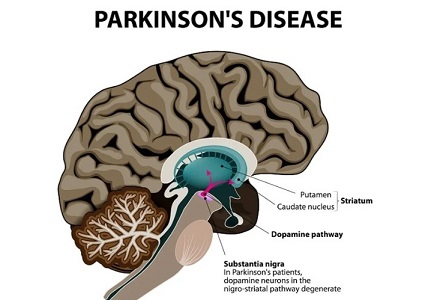Nikhil Prasad Fact checked by:Thailand Medical News Team Apr 06, 2024 1 year, 10 months, 5 days, 8 hours, 41 minutes ago
Medical News: Parkinson's disease is a progressive neurological disorder that affects millions of people worldwide, characterized by a range of symptoms including tremors, slowed movement, muscle stiffness, impaired balance, and speech difficulties. Despite decades of research, there is currently no known cure for Parkinson's, and existing treatments focus primarily on managing symptoms rather than halting or slowing down the disease's progression.
 Lixisenatide Slows Progression Of Parkinson's Disease
The Quest for Neuroprotective Treatments
Lixisenatide Slows Progression Of Parkinson's Disease
The Quest for Neuroprotective Treatments
One area of intense research in Parkinson's disease is the search for neuroprotective treatments. These are therapies that not only alleviate symptoms but also target the underlying mechanisms of the disease, potentially slowing down its advancement and preserving neurological function in patients.
GLP-1 Receptor Agonists: A New Frontier
Among the promising avenues explored in recent years are GLP-1 receptor agonists. Originally developed for managing blood sugar levels in type 2 diabetes, these drugs have shown potential neuroprotective effects in preclinical studies involving animal models of Parkinson's disease. GLP-1 receptor agonists mimic the action of a gut hormone called glucagon-like peptide-1 (GLP-1), which plays a role in regulating insulin and glucose metabolism.
The French Study on Lixisenatide
A significant development in this area came with a study conducted in France that is covered in this
Medical News report. The study focused on lixisenatide, a GLP-1 receptor agonist used in the treatment of diabetes. Researchers aimed to assess whether lixisenatide could slow down the progression of motor symptoms in early-stage Parkinson's disease.
Study Design and Participants
The study enrolled 156 patients diagnosed with early-stage Parkinson's disease. These patients were randomly assigned to receive either lixisenatide or a placebo. The participants, aged between 40 and 75, were carefully selected based on criteria such as the duration of Parkinson's diagnosis (less than three years), stable medication usage for symptom management, and absence of motor complications.
Observations and Results
After a year of follow-up, the researchers observed significant differences between the two groups. Those who received lixisenatide showed no worsening of their movement symptoms compared to those on the placebo. This finding was particularly notable when assessed using the Movement Disorder Society - Unified Parkinson’s Disease Rating Scale (MDS-UPDRS) part III, a standard measure of motor disability in Parkinson's patients.
Interpretation of Results
While the observed effect was described as "modest" by the study's senior author, neurologist Dr Olivier Rascol from Toulouse University, it no
netheless represents a potential breakthrough in Parkinson's treatment. Dr Rascol and his colleagues highlighted that the slower progression of motor symptoms seen in the lixisenatide group could indicate a neuroprotective effect of the drug.
Addressing Concerns and Considerations
However, the study also noted some important considerations. Gastrointestinal side effects, such as nausea, vomiting, and reflux, were relatively common among patients taking lixisenatide. Additionally, a small number of patients experienced weight loss, which could be a concern for individuals with Parkinson's disease who may already struggle with maintaining a healthy weight.
.jpg) Lixisenatide
Expert Insights and Future Directions
Lixisenatide
Expert Insights and Future Directions
Commenting on the study, Dr Michael Okun, the medical director of the Parkinson's Foundation, highlighted the statistical significance of the findings and the need for further investigation into the drug's efficacy and safety. Dr Rodolfo Savica, a neurology professor at the Mayo Clinic, emphasized the importance of replicating the study's results in larger cohorts and potentially exploring age-specific effects of lixisenatide.
Implications for Parkinson's Treatment
The study on lixisenatide opens up new possibilities for Parkinson's treatment. While current medications focus on managing symptoms such as tremors and rigidity, lixisenatide's potential neuroprotective properties could represent a paradigm shift in how the disease is approached. If future research confirms these findings, it could pave the way for targeted therapies aimed at slowing down or even halting the progression of Parkinson's disease.
.jpg) Parkinson's Disease
Challenges and Future Research
Parkinson's Disease
Challenges and Future Research
Despite the promising results, several challenges remain. Long-term safety and efficacy data for lixisenatide in Parkinson's patients are essential. Moreover, optimizing dosages to minimize side effects while maximizing therapeutic benefits will require further investigation. Additionally, exploring the drug's effects in different stages of Parkinson's disease and in diverse patient populations will be crucial for its eventual clinical application.
Conclusion: A Promising Step Forward
In conclusion, the study on lixisenatide's impact on Parkinson's disease progression represents a significant advancement in neurology research. While more extensive studies are needed to validate these findings and address safety concerns, the potential for a neuroprotective treatment for Parkinson's disease is an exciting prospect. With continued research and collaboration between scientists, clinicians, and pharmaceutical companies, we may be moving closer to a future where Parkinson's disease progression can be effectively slowed or halted, improving the quality of life for millions of patients worldwide.
The study findings were published in the peer reviewed journal: New England Journal of Medicine.
https://www.nejm.org/doi/full/10.1056/NEJMoa2312323
For the latest about Parkinson’s Disease, keep on logging to Thailand
Medical News.

.jpg)
.jpg)